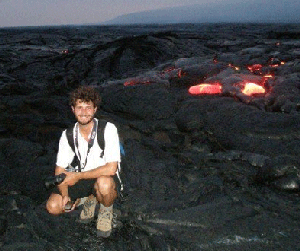ESP Biography
DANIEL SINNETT, 6th Year Stanford PhD student in Geophysics
|
Major: Geophysics College/Employer: Stanford Year of Graduation: G |

|
Brief Biographical Sketch:
I'm a sixth year geophysics grad student working with Paul Segall in the Crustal Deformation and Fault Mechanics group. During the past five years I have studied deformation of Kilauea and Mauna Loa volcanoes using GPS, InSAR (Interferometric Synthetic Aperture Radar), and other geodetic tools. Although my research focuses on the Island of Hawaii (commonly known as the Big Island), I'm interested in volcanoes everywhere and have been so since the age of five. I never grew out of it and feel privileged to continue pursuing my passion here at Stanford. More at: www.pangea.stanford.edu/~dsinnett Past Classes(Clicking a class title will bring you to the course's section of the corresponding course catalog)P1219: From Dante's Peak to Volcano: An Introduction to Volcanology in Splash! Spring 2011 (Apr. 16 - 17, 2011)
We'll explore the basics of volcanology by taking a look at what Hollywood gets right, and wrong, in my two favorite bad volcano movies! In the process we'll learn some basic earth science, volcano monitoring techniques, and how they erupt.
This course should be considered a prerequisite for "Mentos and Diet Coke: A Volcano in Your Backyard!"
P1220: Mentos and Diet Coke: A Volcano in Your Backyard! in Splash! Spring 2011 (Apr. 16 - 17, 2011)
Dropping Mentos into a bottle of Diet Coke is an excellent analog model for a volcanic eruption! In this class we’ll learn about the driving force behind eruptions and use some basic physics to understand the eruption.
At the end of the class we'll develop some experiments and will use the equations to make observations about a few “eruptions” at the end of the course.
P1221: Climate Change: A Discussion in Splash! Spring 2011 (Apr. 16 - 17, 2011)
Is anthropogenic climate change real? What can we do about it? Is it the end of the world?
After a brief introduction outlining some climate basics, we'll have a discussion on the myths and facts surrounding the climate change debate. Come with questions - leave with answers.
The class is scheduled for 1:45 minutes but may end much earlier, depending on student involvement.
S989: Mentos and Diet Coke: A Volcano in Your Backyard in Splash! Fall 2010 (Nov. 13 - 14, 2010)
Dropping Mentos into a bottle of Diet Coke is an excellent analog model for a volcanic eruption! In this class we'll learn about some basic volcanic eruption styles, the driving force behind eruptions, and apply some basic physical principals to a few "eruptions" at the end of the course.
S990: Climate Change - Basics and Discussion in Splash! Fall 2010 (Nov. 13 - 14, 2010)
You will learn the basic science behind climate change, the evidence for change, the evidence that the change is anthropogenic (caused by humans), and what we can do about it.
Questions and discussions from the curious AND the skeptical are greatly encouraged. The class is scheduled for 1hr50min, but may be substantially shorter depending on the length of discussion.
S682: Predicting Volcanic Eruptions - Basics in Splash! Spring 2010 (Apr. 17 - 18, 2010)
Part 1 of 2
Mount St. Helens. Nevado del Ruiz. Pinatubo.
All large, destructive, and recent. Come learn about what the volcanologists got right, and wrong, during each of these eruptions.
The first half of this class (~1 hr) will cover volcano basics, volcano hazards, and how we might predict eruptions using earthquakes, gas, and ground deformation.
In the second half (~1 hr), we will split up into teams to prepare for a volcano simulation using real data. Students will study the volcano, make hazard maps, and plan for the worst...
S685: Climate Change: A Discussion in Splash! Spring 2010 (Apr. 17 - 18, 2010)
Less of a class, and more of a discussion, on the science behind global climate change. Despite a clear scientific consensus on climate change, a significant portion of people still view the science as vague, unclear, or incorrect.
Feel free to come whether you believe the science or are a "skeptic" Come with questions, leave with answers.
S816: Predicting Volcanic Eruptions - Volcano Simulation in Splash! Spring 2010 (Apr. 17 - 18, 2010)
Part 2 of 2
What you learned in part 1 (Predicting Volcanic Eruptions - Basics) will be put to the test - will you be able to predict a volcanic eruption as well as the scientists did?
We will use real earthquake, gas, and deformation data to simulate a volcanic eruption. Teams of students will monitor the volcano's condition, collaborate to issue reports to the mayor (me), issue evacuation orders, and attempt to predict when the volcano will erupt.
The simulation will be ~2hrs.
S504: Predicting Volcanic Eruptions in Splash! Fall 2009 (Oct. 10 - 11, 2009)
Ever here about the eruption of Mt. St Helens? Mt. Pinatubo? The ongoing eruption of Kilauea volcano, Hawaii? Did you know that there are active volcanoes right here in California?
Come learn about the science of predicting when the next volcanic eruption may occur! Topics will include types of volcanoes, styles of eruptions, the tools volcanologists use to monitor volcanoes, and the interface between science and society.
|
|
